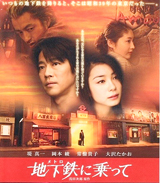| Sick Nurses How does a movie live up to a title like this? Good news: It comes very close. A doctor and several nurses at a Thai hospital run a side business in corpse recycling, but one nurse, the doctor’s spurned girlfriend, is killed to conceal the scam and comes back to annihilate her former colleagues in painfully, gorily apt ways. Bloody, sleazy, sexy and fun all the way, this clever, well-above-average Thai horror/ghost flick is getting plenty of support from genre fans and festival attention. |  |
| Evangelion: 1.0 You Are (Not) Alone Fans of Japanese manga and anime will need no convincing to see this. The first in a four-part re-imagining of the acclaimed original anime series Neon Genesis Evangelion, episode 1.0 pits a number of huge biomechanical vehicles operated by troubled, even traumatized, teens against monstrous invaders after a cataclysm has killed most of the world’s population. The original anime’s director, Hideaki Anno, is at the helm of the four new films, whose pungent mixture of epic combat and aberrant psychology is bound to attract a new generation of admirers. |  |
| Animals in Love The title might raise a few eyebrows, but yes, it is a documentary about the animal kingdom, although one has to ask how the concept can sell tickets when perfectly good stuff is available on cable TV. One might also wonder if this French-produced family fare has been sanitized considering how brutal — and lethal — courtship in the wild can be. Unreleased as yet in English-language markets, this is one film where you are unlikely to need English subtitles. Directed by the photographer of the excellent Winged Migration and with music by Philip Glass. French title: Les Animaux Amoureux. |  |
| Riding the Metro A bitter young Japanese man estranged from his father finds himself and his girlfriend being whisked to and from the past in an underground train. There he finds his father in different stages of his life, leading to a change in the son’s understanding of his family and himself. The few Western reviewers that have watched this film agree that deep inside the family drama and maturation of character is a desire to romanticize a nation’s compromised past and honor paternal authority. Japanese nationalists and other conservatives might therefore be expected to get into this one. Made in 2006. |  |

Last week, on the heels of the recall election that turned out so badly for Taiwan, came the news that US President Donald Trump had blocked the transit of President William Lai (賴清德) through the US on his way to Latin America. A few days later the international media reported that in June a scheduled visit by Minister of National Defense Wellington Koo (顧立雄) for high level meetings was canceled by the US after China’s President Xi Jinping (習近平) asked Trump to curb US engagement with Taiwan during a June phone call. The cancellation of Lai’s transit was a gaudy

Following the shock complete failure of all the recall votes against Chinese Nationalist Party (KMT) lawmakers on July 26, pan-blue supporters and the Chinese Communist Party (CCP) were giddy with victory. A notable exception was KMT Chairman Eric Chu (朱立倫), who knew better. At a press conference on July 29, he bowed deeply in gratitude to the voters and said the recalls were “not about which party won or lost, but were a great victory for the Taiwanese voters.” The entire recall process was a disaster for both the KMT and the Democratic Progressive Party (DPP). The only bright spot for

As last month dawned, the Democratic Progressive Party (DPP) was in a good position. The recall campaigns had strong momentum, polling showed many Chinese Nationalist Party (KMT) lawmakers at risk of recall and even the KMT was bracing for losing seats while facing a tsunami of voter fraud investigations. Polling pointed to some of the recalls being a lock for victory. Though in most districts the majority was against recalling their lawmaker, among voters “definitely” planning to vote, there were double-digit margins in favor of recall in at least five districts, with three districts near or above 20 percent in

From Godzilla’s fiery atomic breath to post-apocalyptic anime and harrowing depictions of radiation sickness, the influence of the nuclear bombings of Hiroshima and Nagasaki runs deep in Japanese popular culture. In the 80 years since the World War II attacks, stories of destruction and mutation have been fused with fears around natural disasters and, more recently, the Fukushima crisis. Classic manga and anime series Astro Boy is called “Mighty Atom” in Japanese, while city-leveling explosions loom large in other titles such as Akira, Neon Genesis Evangelion and Attack on Titan. “Living through tremendous pain” and overcoming trauma is a recurrent theme in Japan’s